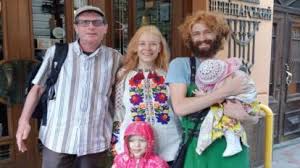Before she was found in Karnataka cave, Russian woman’s 8-year whirlwind romance with Israeli partner

In July 2025, a Russian woman living in a cave in Karnataka made headlines across India. Authorities were stunned to find Nina Kutina, 38, and her two young daughters surviving in the wilderness near Gokarna. However, behind this tale of isolation lies a complex and emotional love story that began eight years earlier with an Israeli man named Dror Goldstein.
A Beachside Romance That Turned Into a Life Together
Nina met Dror in 2017 while they were both exploring Arambol, a quiet beach town in Goa popular with backpackers and spiritual seekers. Their connection was immediate. They shared a love for alternative living, art, and freedom from traditional systems.
Their relationship quickly grew deeper. Within months, they moved in together and began traveling between India and Ukraine. During this period, the couple had two daughters—one born in Ukraine and the other in Goa. Their dream of a family life, though unconventional, seemed to take shape.
Drifting Apart Over Ideals
While they shared strong emotional bonds, their lifestyles began to diverge. Dror wanted to provide stability and education for the children. Nina, on the other hand, leaned into a more spiritual and isolated way of life. She believed that raising her daughters outside the system—free from structured schooling and societal influence—was the best path.
Eventually, tensions rose. Communication became strained, and Nina grew more distant. By 2024, she had cut off most contact. Despite the separation, Dror continued to send financial support and tried to remain involved in his children’s lives.
A Mysterious Disappearance
In December 2024, Dror filed a missing persons report after losing all contact with Nina and the children. They had vanished from their rented home in Goa. Despite his efforts, there were no leads or clues to their whereabouts.
Unbeknownst to him, Nina had taken the children and relocated to a cave in the forests of Gokarna. The family lived without modern amenities—no electricity, no school, and no formal identification. They cooked on a gas stove, bathed in waterfalls, and relied on minimal resources. Daily life involved meditation, painting, and homeschooling through storytelling and chants.
A Shocking Discovery in the Hills
On July 9, 2025, local police stumbled upon the woman and her children during a forest patrol. The area was dangerous, prone to wild animals and landslides. Authorities were concerned not just about the legality of her stay, but also the children’s safety.
It soon emerged that Nina’s visa had expired back in April 2017. She had overstayed in India for more than eight years. The family was moved to a shelter in Karwar, while officials initiated deportation procedures through the Foreigners Regional Registration Office (FRRO).
Life After the Cave
Nina expressed deep unhappiness with the shelter’s conditions. She claimed it was unhygienic, crowded, and mentally distressing. In her view, the life she had built in the forest was far more peaceful and spiritually fulfilling.
Moreover, she accused officials of taking away her personal belongings. These included art supplies, meditation tools, and the ashes of her deceased infant son—items she considered sacred. Nina has publicly stated that her only goal was to raise her daughters in peace, even if it meant living outside conventional norms.
A Father’s Plea for His Daughters
After learning of her discovery, Dror flew to India and approached authorities. He has asked for the right to meet his daughters and be part of their lives. Though he does not seek full custody, he is strongly opposed to the idea of deporting the children to Russia.
According to Dror, sending them away would not only separate them from him but also uproot them from the only country they’ve known. His legal team is exploring options for securing residency or citizenship for the girls under Indian law. One child was born in India, and both have lived there for most of their lives.
Legal and Moral Questions
This case presents a unique challenge. On one hand, there are immigration laws that must be respected. On the other, there are real questions about child welfare, parental rights, and cultural identity. Should children be uprooted from the only environment they’ve known, even if it was unconventional? Can someone be punished for choosing an alternative way of life if no harm was done?
Moreover, the children’s legal status remains in limbo. Some experts argue that they could be eligible for Indian citizenship based on birth and domicile criteria. Others believe the law may not apply in this situation due to visa violations.
A Story Bigger Than the Headlines
Nina Kutina’s story is more than a headline. It’s a reflection of the tensions between freedom and regulation, spirituality and security, love and law. For Nina, the cave was a sanctuary. For Dror, it was a symbol of danger and separation. For the children, it remains the only life they’ve ever known.
As the legal process unfolds, the world watches closely. The final decision will not just determine where Nina and her daughters will live. It may also redefine how we understand family, freedom, and the right to live differently.






